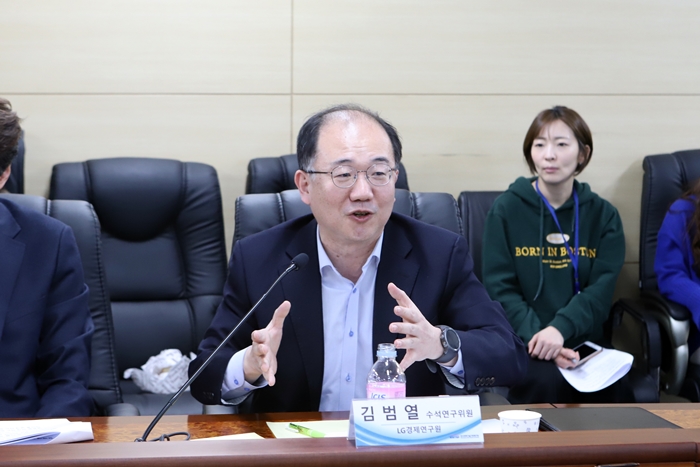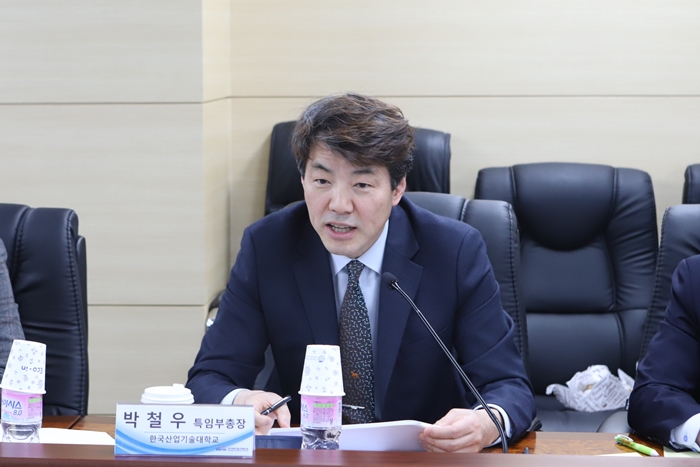News & Event


News & Event
News & Event
[The 102nd KISTEP Wednesday Forum] “Seeking for the Prospect of Social Change and the Direction of Response in Demographic Cliff”
- Writer Kyungran Choi
- Date2019-04-10
- Hit932
File
-
Download
 20190410162552.jpg
(35.39KB / Download 231회)
20190410162552.jpg
(35.39KB / Download 231회)
KISTEP held the 102nd Wednesday Forum with the theme of "Seeking for the Prospect of Social Change and the Direction of Response in Demographic Cliff" on April 10th (Wed), 2019. Our society is entering an era of Demographic cliff, where the ratio of working age population (15-64 ages) is rapidly decreasing due to the low birth rate and aging population, and especially in Korea, it is expected to decline at the fastest pace among OECD member countries over the next 20 years. This is expected to act as a risk factor for the national economy, such as shrinking economic activity and job losses, due to a stagnated national overall production and consumption. Therefore, the forum was held to explore various aspects of social change according to the Demographic cliff and to discuss the direction of Science and Technology (S&T) policies in response for such changes.

[▲ Sang-seon Kim, (President, KISTEP)]
The forum began with an opening address by President Sang-seon Kim (KISTEP), followed by presentation by Hang-Sub Choi (Professor, Dep. of Sociology, Kookmin University). Panel discussion were led by Beumyeol Kim (Senior Research Fellow, LG Economic Research Institute), Chel-woo Park (Vice President, Korea Polytechnic University), Jaesik Jun (Senior Research Fellow, Korea Research Institute for Vocational Education & Training (KRIVET)) and Jung-Jae Lee (Director, Center for HRST Policy, KISTEP) and open floor discussion followed the last.
Professor Hang-Sub Choi explained, “The problems of the era of Demographic cliff due to the low birth rate and aging population are reduced consumption due to increased future anxiety among the elderly, declining production capacity, and incurring social expenses due to the reduction of consumption and side effects of social relations due to the increase in single households.” He added, “If these problems are not resolved, there is a risk that they will lead to economic decline caused by weak consumption, increase the burden of support the elderly population among rising generations, cause job issues of the young and the elderly, and continue to be ranked as No. 1 on the depression and suicide rate among OECD members.”
Professor Hang-Sub Choi explained, “The problems of the era of Demographic cliff due to the low birth rate and aging population are reduced consumption due to increased future anxiety among the elderly, declining production capacity, and incurring social expenses due to the reduction of consumption and side effects of social relations due to the increase in single households.” He added, “If these problems are not resolved, there is a risk that they will lead to economic decline caused by weak consumption, increase the burden of support the elderly population among rising generations, cause job issues of the young and the elderly, and continue to be ranked as No. 1 on the depression and suicide rate among OECD members.”

[▲ Hang-Sub Choi (Professor, Dep. of Sociology, Kookmin University)]
Regarding the direction of response in the era of Demographic cliff, he said, “Unlike environmental issues, marriage and childbirth are difficult to persuade individuals. Therefore, we need to acknowledge that the Demographic cliff is a irreversible situation, and adopt an adaptive paradigm together with a goal-achieving paradigm to cope with the problem of depopulation simultaneously.” He added, “In the end, the key is the happiness of individuals living with the future social environment of Demographic cliff society, and this happiness is determined by the quality of life.”
Lastly, he explained the role of S&T in enhancing the quality of people's lives in the era of Demographic cliff with economic, physical and mental health and social relations conditions. “From economic perspective, we can use big data to lead potential needs of people to actual consumption, which ultimately leads to our individual happiness. In terms of physical and mental aspects, it is possible to overcome competition and conflict through enhancing career years of production ability by medical technology and logical coordination of technology that would resolve conflicts between people. This can create creative and integrative values through collaboration. And in terms of social relations aspect, we will be able to improve the quality of life by responding to the problems of solitude and alienation through the formation of new social relationships between human and machines, such as ‘Virtual People.’
Lastly, he explained the role of S&T in enhancing the quality of people's lives in the era of Demographic cliff with economic, physical and mental health and social relations conditions. “From economic perspective, we can use big data to lead potential needs of people to actual consumption, which ultimately leads to our individual happiness. In terms of physical and mental aspects, it is possible to overcome competition and conflict through enhancing career years of production ability by medical technology and logical coordination of technology that would resolve conflicts between people. This can create creative and integrative values through collaboration. And in terms of social relations aspect, we will be able to improve the quality of life by responding to the problems of solitude and alienation through the formation of new social relationships between human and machines, such as ‘Virtual People.’

[▲ Beumyeol Kim (Senior Research Fellow, LG Economic Research Institute)]
In the panel discussion, Senior Research Fellow Beumyeol Kim suggested, “In the industry sector, especially in the manufacturing sector, low birth rate and aging population are emerging as problems with the labor force, overseas outflow and weak demands. It is necessary to create jobs by creating new industries, develop new products and new technologies to solve these problems. For this, the government needs to support the system by easing regulations on innovative projects and creating social safety nets to enhance flexibility of human resources in order to build an innovative ecosystems such as Silicon Valley.”

[▲ Chel-woo Park (Vice President, Korea Polytechnic University)]
Vice President Chel-woo Park said, “Systematic response through preparing a policy is important to deal with the Demographic cliff in the mid to long term, and we should be precautious about the discontinuation of politics and administration in the middle,” and he explained “In the mid to long term, policy should be prepared to focus on productivity innovation from economic perspective. In political aspects, its scientific movement is necessary. Because population problems are long-term and complex, think-tank is needed to resolve the problems in the mid and long term. Resolving psychological gap is essential in relation to the quality of life in terms of society. Thus, social agreement on the standard of basic quality of life must be decided first," he explained.

[▲ Jaesik Jun (Senior Research Fellow, Korea Research Institute for Vocational Education & Training (KRIVET))]
Senior Research Fellow Jaesik Jun said, “The trend of decreasing the productive population will be tied with the recent issue of shorter working hours, which will lead to a slowdown in the national economic growth caused by decreasing in national productivity. The convergence of employment, social, and S&T policy is necessary for policy-making that can complement the problems of labor shortage in quantitative aspects from a qualitative point of view. We look forward to improving productivity through an industry and technology demand-based educational platform system that can qualitatively complement the absolutely declining manpower of rising generation, and transitional education for active aging.”

[▲ Jung-Jae Lee (Director, Center for HRST Policy, KISTEP)]
Director Jung-Jae Lee emphasized, “Joint universities convergence education program among existing departments should be prepared under the government support. In addition, it is important to raise funds to promote higher value-added productivity improvement through improvement of education and upskill education. Lastly, we need plans to promote the use of potential manpower such as women and foreigners. It is necessary to spread to private sector at the government level, suggesting future organizations and assigned work management system."